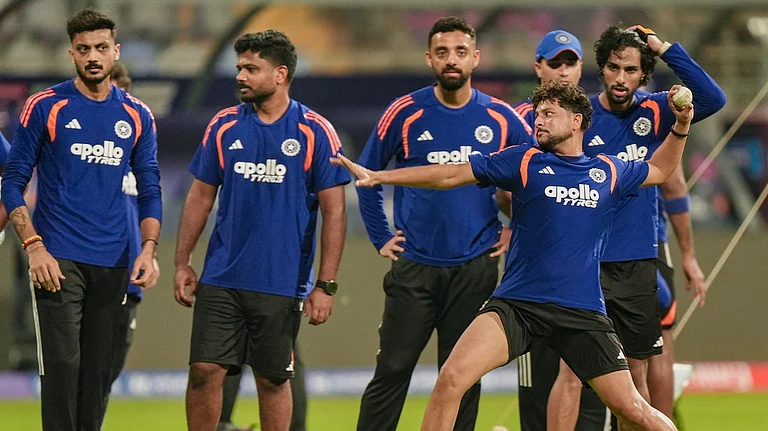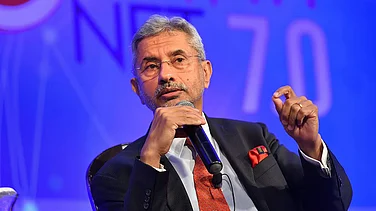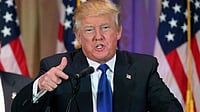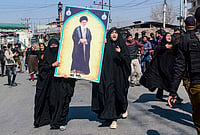In the third day of hearings on pleas against the abrogation of Article 370 f the Constitution in the Supreme Court, Senior Advocate Kapil Sibal on Tuesday questioned the conversion of a state into a union territory (UT).
Sibal further said the decision to scrap Jammu and Kashmir's special status and bifurcate into two UTs of J&K and Ladakh was taken without any consultation from the people and, therefore, was not right.
Sibal also told the Supreme Court that the Executive cannot replace the Constituent Assembly with the Legislative Assembly. He and Chief Justice of India (CJI) DY Chandrachud also had an exchange whether Article 370 was temporary or permanent and what's the manner in which it could be amended.
A five-judge Constitution bench of the Supreme Court, headed by CJI Chandrachud, is hearing a clutch of petitions challenging the abrogation of Article 370. On August 5, 2019, the Narendra Modi government scrapped the special status of Jammu and Kashmir provided under the Article 370 of the Constitution and bifurcated J&K into two UTs of J&K and Ladakh. The bench also comprises Justices Sanjay Kishan Kaul, Sanjiv Khanna, BR Gavai, and Surya Kant.
In the previous hearings, the Supreme Court sought responses on the questions on the nature of Article 370. It asked whether it was part of the Basic Structure and could not be amended and wether it was a temporary or permanent part of the Constitution.
Can't convert state into UT: Kapil Sibal
Arguing against the Modi government's abrogation of Article 370, Kapil Sibal questioned whether you can convert a state into a union territory (UT).
Sibal said while you can carve out UTs from states, you cannot convert an entire state into a UT.
"Can a state be made into a union territory by the union on its own whims and fancy without consulting the people who would be affected...How can you create a UT under this. You can carve a UT but it does not allow extinguishment of a state. If you can do it to one you can do it to others and make it presidential form of govt everywhere," said Sibal, as per Bar & Bench.
When CJI Chandrachud asked whether such conversion into UT is not textually permissible, Sibal said it is not.
Sibal said, "No, you cannot do it. You have created two UTs from a State. Where is that power? There are multiple categories of what they have done which does not fall under any category. How is that possible?"
Sibal further said that the decision was taken without the voice of the people of J&K.
"Where is the representative voice of Jammu and Kashmir. Have we heard them in last four years. You do away with consent by an executive act. You do not take their views. Where do we stand?" said Sibal, as per Bar & Bench.
Can't change state assembly to constituent assembly by an Executive act: Sibal
Sibal argued that the constitutional relationship between J&K and India was based on Article 370 and could not be changed.
Sibal further said that this relationship was changed through two presidential orders in 2019 that were unconstitutional.
"Sibal argued that a constitutional relationship between India and Jammu and Kashmir was enshrined under Article 370 and could not be changed. However, the Union dissipated this relationship through two Presidential Orders in 2019. This was an executive action...He then brought the Court’s attention to Clause 2(d) [of presidential order] which replaced ‘Constituent Assembly’ with ‘Legislative Assembly’, effectively allowing Parliament to recommend abrogation of Article 370," Supreme Court Observer reported Sibal as saying.
A visibly frustrated Sibal further asked “what power does the President have to do this?” and characterised the presidential order as an exercise of executive power rather than a Constitutionally recognised political one, reported SC Observer.
Constitution accepted Article 370 as permanent: Sibal
At one point, CJI Chandrachud asked Sibal whether Article 370 was a permanent provision of the Constitution.
To this, Sibal said nothing in India contradictory of Article 370 was ever done and that showed the Constitution accepted the provision as permanent, reported SC Observer.
Chandrachud further said that if Article 368 of the Constitution allows articles to be amended, then Article 370 too can be amended.
"If we accept that Article 368 is used for amending all articles then Article 370 will also be covered. Then the argument that there is no power to amend can (only) be a moral argument but not a legal one," said Chandrachud, as per Bar & Bench.
In previous hearings too, the nature of Article 370 had come up, with the Apex Court asking the petitioner whether the provision was part of the Basic Structure of the Constitution that could not be amended and whether it was permanent.
Bar & Bench reported, "The Court sought to know whether the Article was envisaged as a permanent provision merely because the Constituent Assembly of Jammu and Kashmir (J&K), which was empowered to recommend the deletion of the provision, ceased to exist in 1957. During the last hearing, the top court had asked whether the Article would become part of the basic structure of the Constitution if it is accepted that Article 370 of the Constitution became permanent when the constituent assembly of Jammu and Kashmir was dissolved in 1957."






















